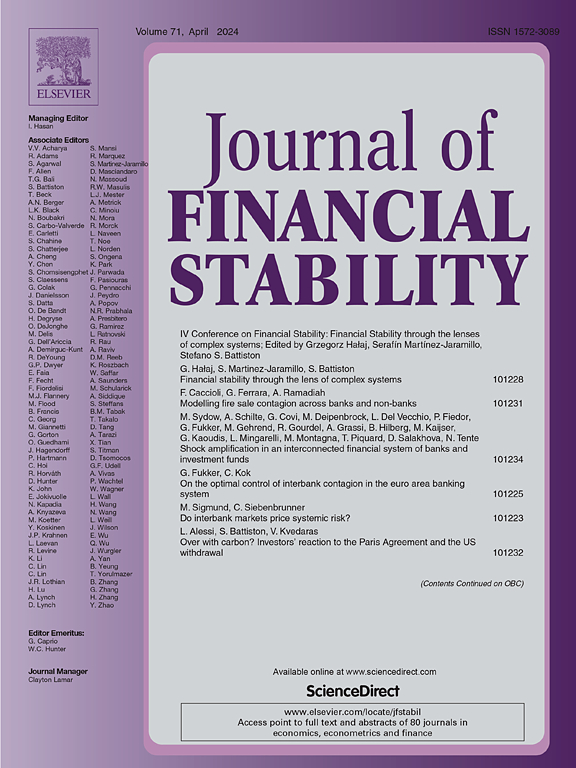Does FinTech Increase Bank Risk-taking?
IF 4.2
2区 经济学
Q1 BUSINESS, FINANCE
引用次数: 0
Abstract
Motivated by its rapid growth, this paper investigates how FinTech activities influence risk-taking by financial intermediaries (FIs). In this context, the paper revisits an ongoing debate on the impact of competition on financial stability: on one side, it is argued that greater competition encourages greater risk-taking (competition-fragility hypothesis), while the other side asserts that more competition can increase financial stability (competition-stability hypothesis). Using a curated database covering over 10,000 FIs and global FinTech activities, we find a robust relationship whereby greater FinTech presence is associated with heightened risk-taking by FIs, offering support for the competition-fragility hypothesis. However, the inclusion of bank-, industry, and country-specific characteristics can alter this relationship. Importantly, there is suggestive evidence indicating that in certain cases, greater FinTech presence may be associated with less FI risk-taking amid stronger domestic institutions. Notwithstanding the relevance for policy, this paper presents a novel framework that may help reconcile some of the conflicting results in the literature, which have found supportive evidence for each of the two competing hypotheses.
金融科技会增加银行风险吗?
受其快速增长的推动,本文研究了金融科技活动如何影响金融中介机构(fi)的风险承担。在此背景下,本文回顾了关于竞争对金融稳定影响的持续辩论:一方面,它认为更大的竞争鼓励更大的冒险(竞争-脆弱性假设),而另一方面断言更多的竞争可以增加金融稳定(竞争-稳定性假设)。利用涵盖10,000多家金融机构和全球金融科技活动的精心策划的数据库,我们发现了一种强有力的关系,即金融科技的增加与金融机构的风险承担程度增加有关,这为竞争脆弱性假说提供了支持。然而,将银行、行业和国家的具体特征纳入其中可能会改变这种关系。重要的是,有证据表明,在某些情况下,在更强大的国内机构中,更大的金融科技存在可能与更少的金融机构风险相关。尽管与政策相关,本文提出了一个新的框架,可能有助于调和文献中一些相互矛盾的结果,这些结果为两个相互竞争的假设中的每一个都找到了支持性的证据。
本文章由计算机程序翻译,如有差异,请以英文原文为准。
求助全文
约1分钟内获得全文
求助全文
来源期刊

Journal of Financial Stability
Multiple-
CiteScore
7.70
自引率
9.30%
发文量
78
审稿时长
34 days
期刊介绍:
The Journal of Financial Stability provides an international forum for rigorous theoretical and empirical macro and micro economic and financial analysis of the causes, management, resolution and preventions of financial crises, including banking, securities market, payments and currency crises. The primary focus is on applied research that would be useful in affecting public policy with respect to financial stability. Thus, the Journal seeks to promote interaction among researchers, policy-makers and practitioners to identify potential risks to financial stability and develop means for preventing, mitigating or managing these risks both within and across countries.
 求助内容:
求助内容: 应助结果提醒方式:
应助结果提醒方式:


